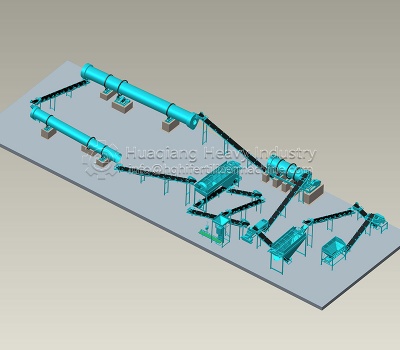The bio-organic fertilizer production line uses advanced bio-technology to convert large quantities of manure from livestock farming into high-efficiency bio-organic fertilizer. This not only tackles environmental pollution but also enables resource recycling, generating significant ecological and economic benefits.
- The Potential of Livestock Manure
Livestock manure is rich in organic matter and nutrients like nitrogen, phosphorus, and potassium, making it an excellent raw material for bio-organic fertilizer. For example, manure from one pig can boost grain production by 100-150 kg, proving that these “waste” materials hold immense agricultural value. Modern organic fertilizer processing equipment efficiently treats manure, eliminating pathogens and insect eggs while converting it into safe, high-quality fertilizer.
- Production Process of Bio-Organic Fertilizer
A complete production line typically includes core steps: raw material pretreatment, mixing, microbial inoculation, aerobic fermentation, post-processing, and packaging. The fermentation stage is most critical, as it accelerates the growth of beneficial microorganisms and breaks down organic matter. The entire process is intelligent, eco-friendly, and resource-efficient, ensuring compliance with national bio-organic fertilizer standards.

- Key Equipment
Modern production lines mainly consist of crushers, mixers, compost turning machines, granulators, drying ans cooling systems, screening machines, and automated packaging systems. These specialized devices work together to ensure efficient conversion from raw manure to finished product. Notably, advanced windrow compost turning machines enhance microbial activity and fermentation efficiency by thoroughly aerating materials.
- Future of Fertilizer Recycling
With national policies promoting reduced chemical fertilizer use and the rise of organic farming, demand for bio-organic fertilizer continues to grow. Manure-derived fertilizer improves soil pH, boosts organic content, and enhances crop quality and yield, making it vital for sustainable agriculture.
The bio-organic fertilizer production line bridges livestock waste management and modern farming, driving agriculture toward greener, circular, and sustainable practices.


